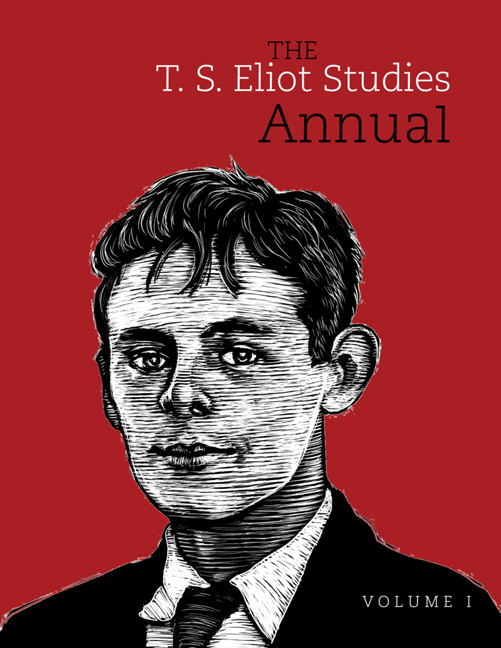Book contents
- Frontmatter
- Contents
- Abbreviations of Works
- General Editor's Note
- The Short and Surprisingly Private Life of King Bolo: Eliot's Bawdy Poems and Their Audiences
- Dull Tom-Tom's Absurd Prelude: Ludic Modernism in Early T. S. Eliot
- Eliot at Bergson's Lectures, 1910–1911
- The American Legacy of “Prufrock”
- Poetry (June 1915)
- The Stale Dregs of Revolt
- Prufrock, Belated
- Eliot's Allusive Legacy and Obscurity in “Prufrock”
- Transmuting F. H. Bradley: T. S. Eliot's Notes Towards a Theory of Poetry
- T. S. Eliot, Phenomenologist
- Astride the Dark Horse: T. S. Eliot and the Lloyds Bank Intelligence Department
- Aristophanic Structures in Sweeney Agonistes, “The Hollow Men,” and Murder in the Cathedral
- Eliot and Virgil in Love and War
- T. S. Eliot Bibliography 2014
- Notes on Contributors
Poetry (June 1915)
- Frontmatter
- Contents
- Abbreviations of Works
- General Editor's Note
- The Short and Surprisingly Private Life of King Bolo: Eliot's Bawdy Poems and Their Audiences
- Dull Tom-Tom's Absurd Prelude: Ludic Modernism in Early T. S. Eliot
- Eliot at Bergson's Lectures, 1910–1911
- The American Legacy of “Prufrock”
- Poetry (June 1915)
- The Stale Dregs of Revolt
- Prufrock, Belated
- Eliot's Allusive Legacy and Obscurity in “Prufrock”
- Transmuting F. H. Bradley: T. S. Eliot's Notes Towards a Theory of Poetry
- T. S. Eliot, Phenomenologist
- Astride the Dark Horse: T. S. Eliot and the Lloyds Bank Intelligence Department
- Aristophanic Structures in Sweeney Agonistes, “The Hollow Men,” and Murder in the Cathedral
- Eliot and Virgil in Love and War
- T. S. Eliot Bibliography 2014
- Notes on Contributors
Summary
The cover of Poetry (June 1915) named eight contributors. Their names took markedly different forms. In order of appearance: Ajan Syrian, Arthur Davison Ficke, Bliss Carman, Dorothy Dudley, Georgia Wood Pangborn, William Griffith, Skipwith Cannéll, and T. S. Eliot.
The last of these namings is more than distinctive, it is unique.
It is distinguished, first, from the five who muster two names. (Dorothy Dudley, we hear in the notes to contributors, might have featured—a la Mrs. Henry Wood—as Mrs. Henry B. Harvey.) It is distinguished, second, from the couple of contributors who sport three names: a man, whether married or not—Arthur Davison Ficke—and a married woman, Georgia Pangborn, nee Wood. True, there are other unique forms of namery here: Ajan Syrian is not exactly his name (the notes on contributors have him as “Ajan Syrian” in inverted commas), and Skipwith Cannéll has an accent. But it is T. S. Eliot, upon his initial appearance in a literary world beyond that of school or college, who stands out. Stands there, complete.
He went by many names. During 1915–16 he signed himself not only “T. S. Eliot” but “T. Stearns Eliot,” “Thomas S. Eliot,” and “Thomas Stearns Eliot.”
Of the other names that figure on the cover, two come twice. The first is that of a woman: “Edited by Harriet Monroe,” “Copyright 1915 by Harriet Monroe.” The second is that of a man, a contributor not to this number of “A Magazine of Verse” but to the tragedy of the Great War: there is a sequence of five poems “To Rupert Brooke,” Died before the Dardanelles, April, 1915 (shades of Jean Verdenal, “mort aux Dardanelles”). And there are three pages of elegiac ecstasy, “The Death of Rupert Brooke.”
The names of a few of the contributors are not on the cover. Of these, two who are commentators will append solely their initials to their contributions. By convention, these are at once more modest and more proud than names, since initials may represent either subordination or ordination.
- Type
- Chapter
- Information
- The T. S. Eliot Studies Annual , pp. 73 - 84Publisher: Liverpool University PressPrint publication year: 2017



